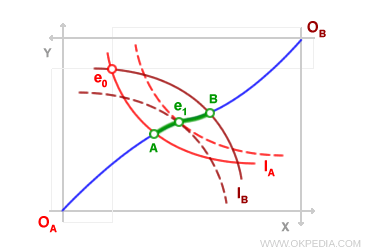Core of the Economy
The core of the economy is the set of feasible allocations where both consumers, starting from their initial endowments, can improve their well-being through mutually beneficial exchange - that is, in terms of a Pareto improvement. In an Edgeworth box, the core corresponds to the portion of the contract curve that lies between the initial indifference curves of the two consumers. For example, in the diagram below, the consumers begin at the initial allocation point e0.

The point e0 is not a stable equilibrium and represents a Pareto-inefficient allocation. By trading portions of their initial endowments, both consumers can achieve higher utility levels, eventually reaching the optimal point e1 - a Pareto-efficient allocation. The green segment AB of the contract curve - bounded by points A and B where the blue contract curve intersects the two initial indifference curves IA and IB - is known as the core of the economy. From the starting point e0, this core represents all exchange outcomes that are efficient in the Pareto sense.
